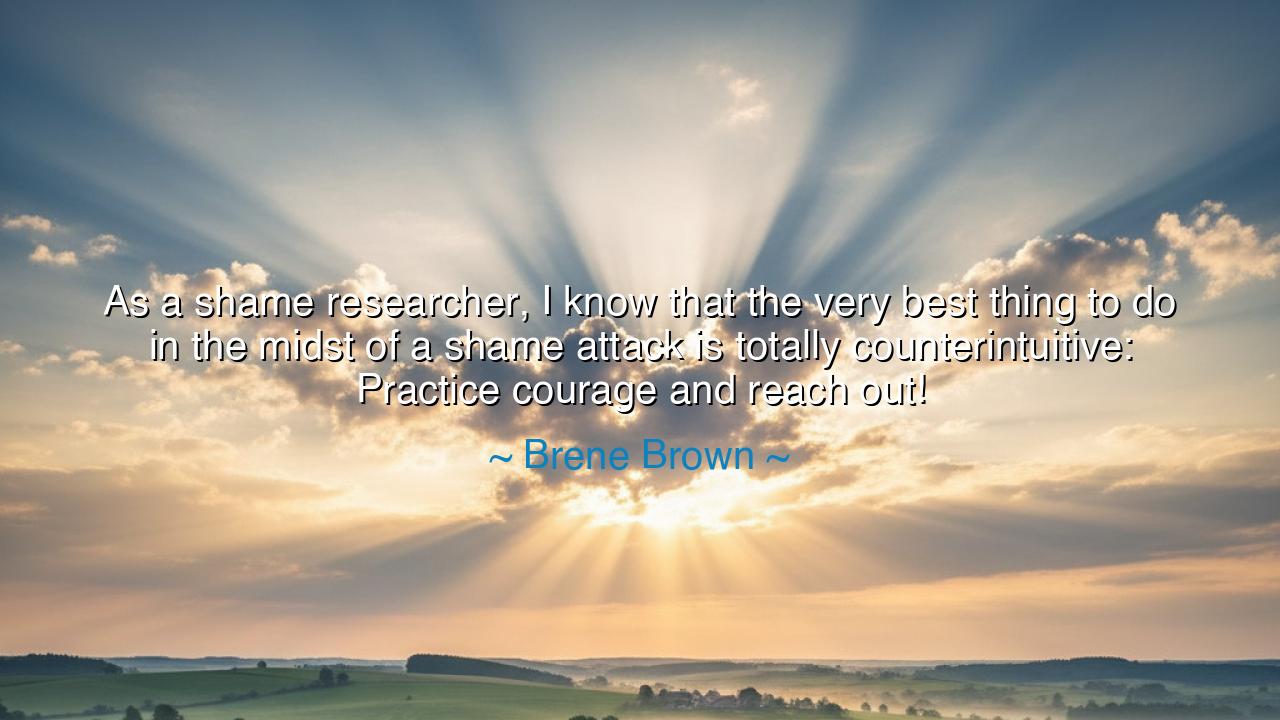
As a shame researcher, I know that the very best thing to do in
As a shame researcher, I know that the very best thing to do in the midst of a shame attack is totally counterintuitive: Practice courage and reach out!






In the wisdom of the ages, the words of Brené Brown ring like a bell across the valleys of the human heart: “As a shame researcher, I know that the very best thing to do in the midst of a shame attack is totally counterintuitive: Practice courage and reach out.” This teaching, though wrapped in the language of modern times, carries the same eternal truth spoken by sages, warriors, and healers throughout history: when pain demands isolation, salvation lies in connection.
Shame, that ancient serpent of the soul, whispers lies that we are unworthy, unlovable, and beyond redemption. It coils around the heart, bidding us to retreat into darkness and silence. Yet Brené Brown, like a healer standing at the mouth of the cave, calls us instead to step into the light—to do the thing our fear most resists. To reach out is to defy shame’s dominion. To practice courage is to remember that vulnerability is not weakness, but the truest expression of strength.
Consider the tale of the Spartan soldier, wounded and alone upon the battlefield. His comrades had fallen, his armor shattered, his spirit heavy with the weight of failure. It would have been easier to crawl into the shadows and perish quietly. Yet he cried out—not in despair, but in faith that his brothers would hear him. And they did. They carried him home, and his courage to reach out became the seed of his survival. So too, in our battles unseen, the act of calling for help is not surrender but victory over the silence shame commands.
For courage does not roar like the lion in triumph—it often trembles, whispers, and weeps. It is the quiet act of sending a message to a friend when the heart feels unworthy of love. It is the prayer whispered through tears, the confession made through trembling lips. In these moments, the soul chooses life over isolation, truth over pretense, and connection over concealment. This is the alchemy of healing: that which feels weakest is, in truth, the birth of strength.
The ancients knew this well. When the Israelites wandered in the desert, their greatest wounds were not of body but of spirit—the belief that they were forsaken. Only when they lifted their eyes to one another, shared their hunger, and wept together did they find the will to continue. Likewise, in every age, those who have endured the storms of shame and despair have found redemption not in solitary pride but in the humble act of reaching out.
Remember this: shame thrives in secrecy. It festers in the quiet chambers of the mind, where no light can enter. But when spoken aloud, it weakens. When shared with another, it begins to dissolve. Thus, to practice courage is to break the spell—to speak the unspeakable, to open the gates of the heart, and to allow compassion to flow where once there was fear.
Let this then be your lesson, passed down like fire from one generation to the next: when shame bids you hide, step forward. When it tells you that you are unworthy, reach for another hand. Do not wait for the fear to fade; act in spite of it. Speak to a friend, a mentor, or even to the mirror itself. Each act of connection is a sword drawn against despair.
And so, the path is clear: in the hour of greatest darkness, do the counterintuitive thing. Reach outward. Call upon your tribe. Let courage rise not as a battle cry, but as a soft and steady flame. For in that reaching, you will find not only healing—but yourself reborn, whole and unashamed.






AAdministratorAdministrator
Welcome, honored guests. Please leave a comment, we will respond soon